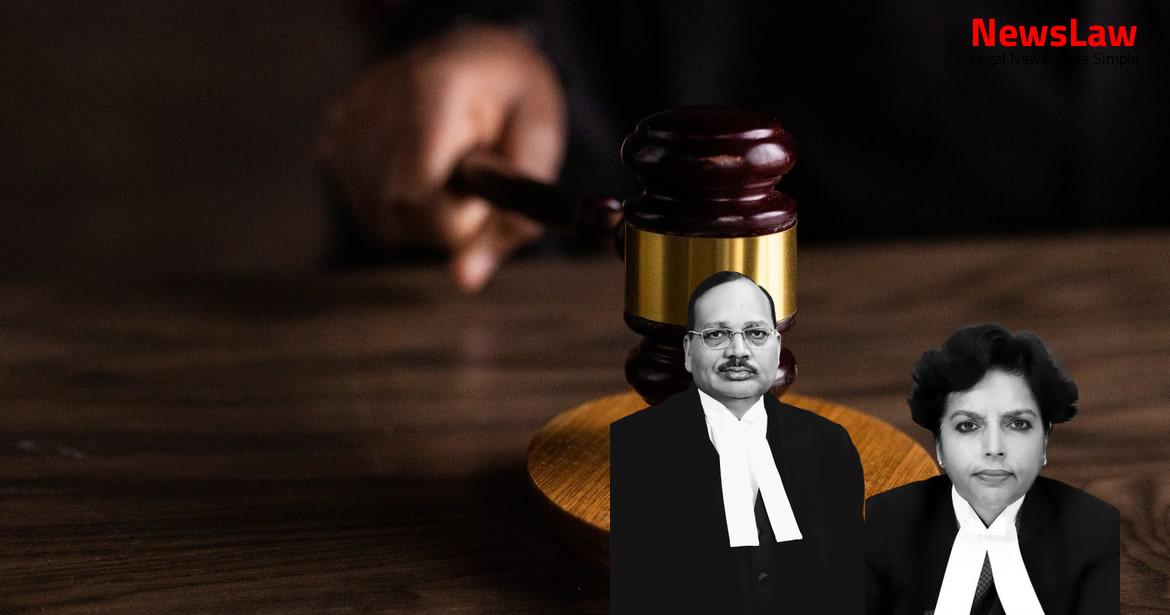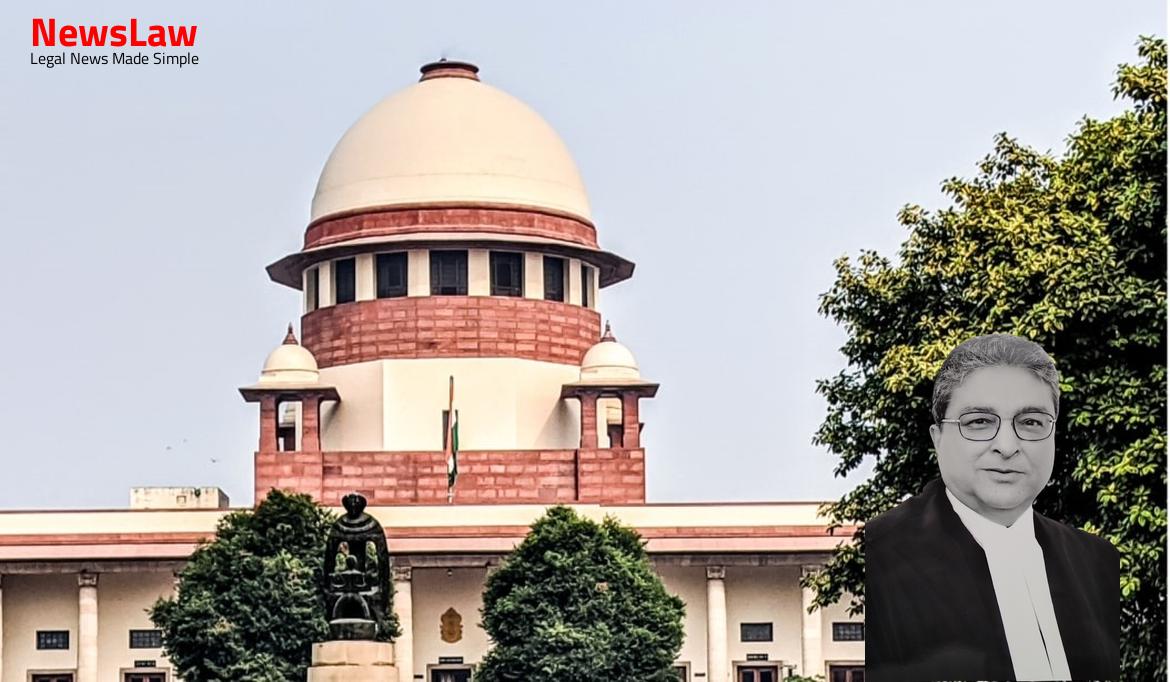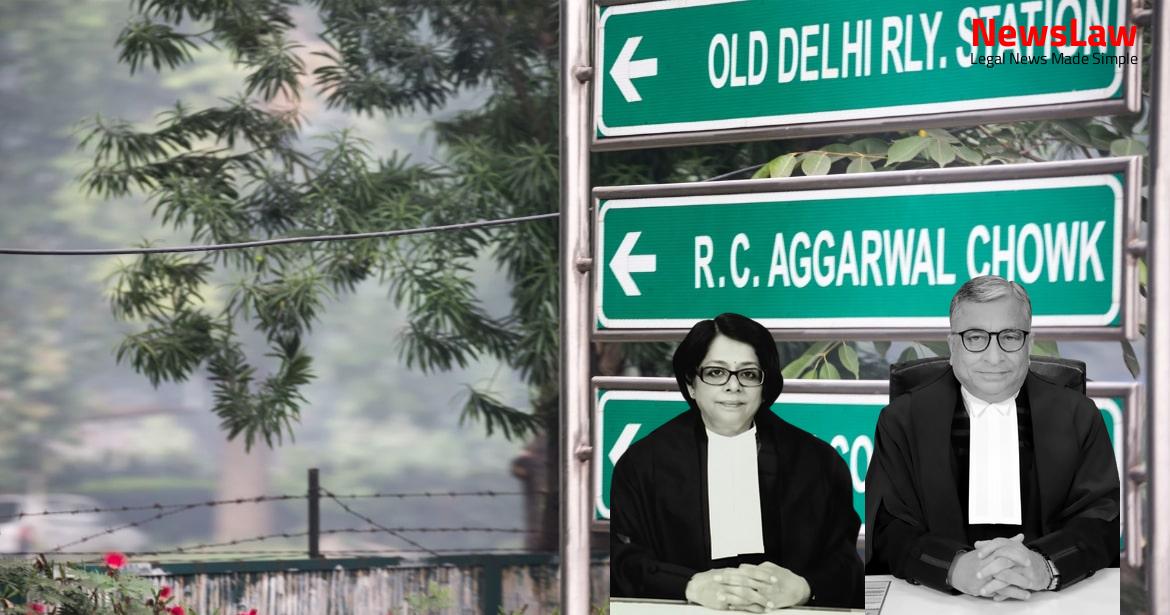Dive into the intricate legal analysis conducted by the court regarding marriage nullity and maintenance rights in a recent judgment. The case delves into the application of Sections 5, 11, and 15 of the Hindu Marriage Act, shedding light on how these statutory provisions impact matrimonial disputes. Understanding the court’s interpretation and application of key legal principles is essential in navigating complex family law cases.
Facts
- Criminal proceedings quashed due to null and void marriage during pending appeal
- Application for maintenance allowed in favor of the Appellant
- Civil Revision Petition by Respondent challenging maintenance order dismissed
- Criminal Revision Petition by Appellant against denial of maintenance also dismissed
- Question raised on whether second marriage during pending divorce appeal is nullity
- Sections 5, 11, and 15 of Hindu Marriage Act, 1955 relevant to the appeal
- Judgment by High Court dismissing Criminal Revision Case No 2587 of 2017
- The Appellant filed an appeal against the decree of divorce on 28.06.2005, with the period of limitation expiring on 26.09.2005.
- The Appellant’s second marriage also did not work out.
- The delay in filing the appeal was condoned by an order dated 13.7.2007.
- Respondent No.1 filed a criminal Revision Petition challenging the order rejecting his discharge application.
- The Metropolitan Sessions Judge discharged Respondent No.1 from the proceedings under various sections of the IPC without notice to the Appellant.
- Appellant filed a maintenance application under Section 125 CrPC, which was dismissed.
- Respondent No.1 filed a petition to quash criminal proceedings against him under Sections 406, 498A, and 506 of the IPC.
- Appellant filed a complaint under the Domestic Violence Act in 2015.
- Appellant lodged a complaint against Respondent No.1 at the Banjara Hills Police Station which resulted in FIR No.470/2015.
- Various legal actions and counteractions were taken by both parties, including appeals, suits, and petitions.
Also Read: Analysis of Evidence in an Attempted Murder Case
Analysis
- Marriage solemnized after the commencement of the Act shall be null and void if it contravenes conditions specified in Sections 5(i), (iv) and (v) of the Hindu Marriage Act.
- A marriage declared null and void is not recognized as a valid marriage in the eyes of the law.
- Applications for maintenance can be set aside if the marriage is deemed null and void.
- Section 15 of the Hindu Marriage Act allows individuals to remarry if their marriage has been dissolved by a decree of divorce without any right of appeal or if the appeal has been dismissed.
- Contravention of Section 5(ii) or 5(iii) of the Hindu Marriage Act does not render the marriage null and void.
- The criteria for solemnizing a marriage between two Hindus are outlined in Section 5 of the Act, with specific conditions that must be met.
- Only the contravention of certain conditions specified in Section 5 makes a marriage void.
- Marriage in contravention of Section 5(i) regarding spouses already living at the time of marriage is considered void.
- A marriage under certain prohibitions may be void or voidable depending on the circumstances and customs.
- Section 11 of the Act allows for a marriage to be declared null and void through a decree of nullity on specific grounds.
- In cases where there is no explicit prohibition stated, but rather positive words like ‘it shall be lawful’, inferring nullity becomes more difficult.
- A marriage contracted before it became lawful, even if deemed unlawful due to a disability created by specific language, cannot be considered void without clear consequences for the breach.
- The court in Anurag Mittal v. Shaily Mishra Mittal emphasized that the purpose of Section 15 is to protect individuals appealing a decree of marriage dissolution, ensuring their appeal is not thwarted.
- Prohibitions on contracting a second marriage for a specified period do not imply that the previous marriage remains valid or presumed to be so.
- An incapacity to remarry for a set time does not equate to the former marriage being in force.
- The decision in Leela Gupta v. Laxmi Narain (1978) clarifies that marriages contracted under incapacity, even if prescribed by law, are not void unless explicitly declared as such.
- The law, as established by the court, holds that marriages during a proscribed period are not automatically void due to the incapacity imposed.
- In instances where the law uses prohibiting language like ‘it shall not be lawful’, the incapacity to marry does not inherently render the marriage void.
- The protection of Section 15 primarily benefits a person contesting a divorce decree.
- Marriages made void or punishable under the Act are distinct, with consequences not provided for in marriages that contravene Section 15.
- A marriage cannot be considered void if the ex-spouse legally remarried with no living spouse, as in the appellant’s case.
- The legislative intent was not to invalidate a marriage due to a belated appeal.
- The conditions for a valid marriage remain unaffected in this scenario.
- The bar of Section 15 is not applicable when the appeal is filed after the limitation period has expired.
- Section 15 permits a marriage after divorce if no appeal is filed within the set timeframe.
- The bar under Section 15 only applies if an appeal is filed within the limitation period, not after its condonation.
- The appeal in this case was ineffective from the start as the ex-husband had remarried legally after the limitation period expired with no appeal filed.
- The bar under Section 15 does not apply if there is no appeal within the limitation period, unless there is a stay or restraining order.
- The appeal was essentially fruitless as the ex-husband had remarried legally after the limitation period with no appeal filed.
- The prohibition against one party from contracting a second marriage for a certain period does not nullify the divorce and continue the dissolved marriage.
- A marriage contracted during the pendency of an appeal from a decree is not void ab initio, especially when the appeal is filed after the expiration of the limitation period.
- Maintenance cannot be refused on the ground of nullity of marriage until there is a declaration of nullity by a competent court in proceedings under Section 11 of the Hindu Marriage Act.
Also Read: Ownership Dispute in Motor Vehicle Insurance Case
Decision
- M.C. No. 152 of 2015 remitted to the appropriate Court for determination of the Appellant’s claim to maintenance.
- Respondent No.1 to pay a lump sum amount of Rs.1,00,000/- towards arrears of maintenance within four weeks.
- Appeal allowed, setting aside the order dated 7.8.2017 of the Additional Metropolitan Sessions Judge, Hyderabad.
- Appellant entitled to maintenance of Rs.20,000/- per month as directed by the Family Court’s order dated 19.12.2018.
- The judgment and order under appeal cannot be sustained due to reliance on a specific criminal petition.
Also Read: Interpretation of Retirement Age in Government Service
Case Title: KRISHNAVENI RAI Vs. PANKAJ RAI (2020 INSC 211)
Case Number: Crl.A. No.-000321-000321 / 2020



